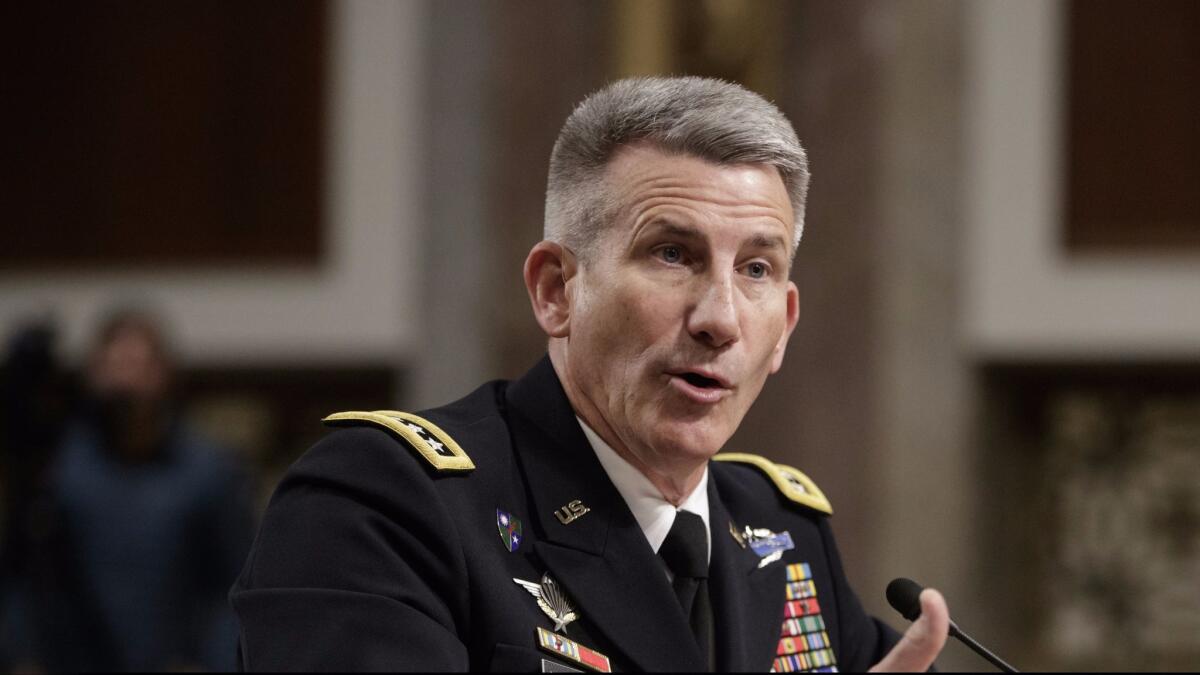Top U.S. general in Afghanistan said thousands more troops needed for fight against Taliban

Reporting from Washington — The top U.S. commander in Afghanistan said Thursday that he needs several thousand more troops to help Afghan government forces break a stalemate with the Taliban less than a year after President Obama drew down American forces.
Gen. John W. Nicholson Jr. told the Senate Armed Services Committee that more troops are needed to help train Afghanistan’s military and police forces as they battle Taliban insurgents, Islamic State militants and other militias.
For the record:
11:52 p.m. Aug. 23, 2019An earlier version of this article referred to the U.S. special inspector general for Afghanistan reconstruction as the Pentagon’s special investigator general for Afghanistan reconstruction.
“We have a shortfall of a few thousand,” he said. He said the troops could come from the United States or other countries in the international coalition in Afghanistan.
President Trump said little about America’s longest war, now in its 16th year, during the campaign last year or since taking office. He has spoken far more often about U.S. military efforts to defeat Islamic State in Iraq and Syria, where the militants have steadily lost ground over the last year.
The Taliban, in contrast, controls more territory now than at any point since the U.S.-led invasion in 2001, according to United Nations estimates. And the Pentagon has far more troops in Afghanistan than in Iraq and Syria.
In July, President Obama ordered a reduction of U.S. troops to 8,400 from 9,800 by the end of 2016, backing off his 2008 campaign promise to extricate the U.S. from the punishing war.
Nicholson, commander of U.S. and North Atlantic Treaty Organization forces in Afghanistan, oversees about 6,300 NATO troops from 38 countries in addition to U.S. troops.
Nicholson wants more advisors to assist Afghan army commanders at the brigade level, rather than at the higher corps level, he said.
U.S. special operations troops routinely accompany and advise Afghan forces on combat missions, while U.S. fighter jets and drones provide air support and surveillance. The U.S. also has a counter-terrorism mission, which Nicholson said was adequately staffed, to track and kill militant leaders.
Nicholson described the war against the Taliban as “a stalemate.” He said Afghan forces had suffered twice as many casualties in the last two years as U.S. forces did in 10 years.
The Afghan government controls about 57% of the country’s populated districts, down from about 72% in November 2015, according to a report released Jan. 30 by the the U.S. special inspector general for Afghanistan reconstruction.
“Our Afghan partners have been sustaining very significant losses,” Nicholson said. “And I’m not sure that’s sustainable.”
Nicholson also said Russia was “legitimizing” the Taliban by creating a “false narrative” that the fundamentalist Sunni Muslims insurgents are fighting Islamic State militants, who are also Sunni Muslims, in Afghanistan.
He said Iran continues to arm and fund Shiite Muslim fighters in Afghanistan.
“When we look at Russian and Iranian actions in Afghanistan, I believe that... they’re trying to undermine the United States and NATO and prevent this strong partnership that we have with the Afghans in the region,” he added.
Twitter: @wjhenn
ALSO:
Climate change is real: Just ask the Pentagon
Overweight, tattooed, stoned? The Pentagon may still want you
More to Read
Sign up for Essential California
The most important California stories and recommendations in your inbox every morning.
You may occasionally receive promotional content from the Los Angeles Times.











